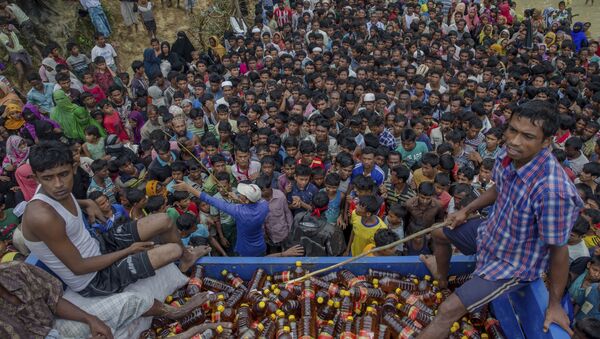Dr. Ashraf Hoque, an anthropologist at University College London and expert on Bangladesh, said the roots of the Rohingya crisis are more than 100 years old.
"It all goes back to the colonial period. The Rohingya were migrant laborers who were moved over to Burma to work on tea and rubber plantations and they remained there after the British left," Dr. Hoque, who has just returned from Bangladesh, told Sputnik.
Urgent message to the UN from @HRW's researcher on the Myanmar-Bangladesh border, watching ethnic cleansing of Rohingya Muslims unfold. pic.twitter.com/k1dzfJwAy7
— Kenneth Roth (@KenRoth) 18 September 2017
Up until 1937 Burma — or Myanmar as it is now known — was part of British India.
"They were peasant Bengali workers who were encouraged to move to Burma, and then the British left and drew arbitrary lines on the map they found themselves on the wrong side," Dr. Hoque said.
He also said it was a common British policy, and it had also led to the movement of large numbers of Tamils to tea plantations in Ceylon — now known as Sri Lanka — which would later lead to ethnic violence and civil war with the island's Sinhalese majority.
Laborers were also transported from British India to South Africa, Trinidad and Guyana.
Dr. Hoque said the Rohingya had suffered discrimination in the western province of Rakhine for many years, but it was only since 2008 that it had broken out into violence and ethnic cleansing.
Aung San Suu Kyi claims no military "clearance operations" in Rakhine since 5 Sept! What's this then? She's delusional. pic.twitter.com/EcSicI1XL0
— Jonathan Miller (@millerC4) 19 September 2017
'Easy Fodder'
"There has been a rise of militant Buddhism which has an anti-Muslim slant and the Rohingya are 'easy fodder' to cleanse. It has been going on for a long time and it has only come into the public eye now, partly due to pressure from Turkey and Iran. Buddhist monks are very anti-Muslim and the junta has been implicated too," he told Sputnik.
"It's a colonial legacy and the British government has a responsibility. Either they do something about it directly or use their diplomatic muscle to get Burma to intercede but they don't seem to have done any of that," Dr. Hoque told Sputnik.
"There have been villages burned down and children beheaded and lots of horrible things happening… these people are very vulnerable and Britain should be taking a lead on this globally," he told Sputnik.
The Arakan Rohingya Salvation Army, a rebel group fighting for a Rohingya homeland, has denied it has any links with Daesh or other Muslim terrorists.
Help From Bangladesh
Three years later another crisis broke out, far away in Europe, which has echoes of the Rohingya crisis.
In 1974, Turkey invaded Cyprus to protect Turkish Cypriots from ethnic cleansing at the hands of extremist elements of the Greek Cypriot Eoka-B movement.
This is why Bangladesh PM Sheikh Hasina didn't ask Donald Trump for help with Rohingya refugees. pic.twitter.com/pCMRuS3BAE
— Al Jazeera English (@AJEnglish) 19 September 2017
But Bangladesh is not in a position to invade Myanmar to offer protection to the Rohingya.
Mr. Hoque said there was certainly no appetite for Bangladesh to send soldiers or tanks over the border into Myanmar.
Their army is significantly smaller and less well equipped than the Myanmar army, but perhaps more significantly there are important trade connections which make Dhaka reliant on Myanmar.
"Bangladesh is reliant on imports from Myanmar, and as a result, it has been very diplomatic, but at the same time, they recognize the Rohingya are ethnic Bengalis and their language is Bangla," Dr. Hoque told Sputnik.
STATEMENT (14.9.2017): #ARSA
— ARSA_The Army (@ARSA_Official) 14 September 2017
- On Humanitarian Pause
— Categorically Denies Allegations of Links with Transnational Terror Groups.#Rohingya pic.twitter.com/IpHSNd5qgO
Dr. Hoque said the Bangladesh government had until recently maintained a policy of turning the Rohingya back.
"But most Bangladeshis regard them as Bengali and as their brothers and sisters and would like to see them being accommodated by the government. They want to embrace them and find refuge for them. That is now the zeitgeist of popular opinion," he told Sputnik.
16 thousand Rohingya women are pregnant. Every woman is having 7 to 10 children. Good that Bangladesh giving them family planning advice
— taslima nasreen (@taslimanasreen) 19 September 2017
Bangladesh is in the process of beefing up and modernizing its military, under the Forces Goal 2030 program, and last year it bought two submarines from China for its navy.
Burma became independent in 1948, a year after India and Pakistan. In 1971, East Pakistan broke away from West Pakistan and became Bangladesh.
Myanmar's de facto leader Aung San Suu Kyi has been heavily criticized by her inability to stop the violence.

